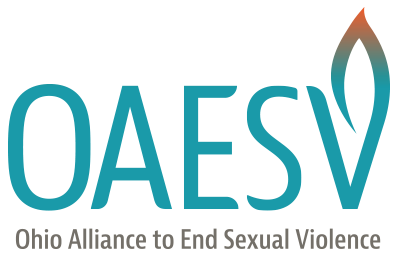OAESV’s Advocacy Day & the Impact on Ohio Survivors
During Sexual Assault Awareness Month (SAAM), our community energizes, bringing sexual violence issues to the forefront of public conversation in a variety of formats. On April 8, we have the opportunity to bring a unified message to the Ohio Statehouse, and meet directly with lawmakers about changes for survivors during this legislative session. To improve legislative and executive understanding, we must clearly and impactfully explain the realities of sexual violence, and the legal changes necessary to meet survivor needs.
In the past several years, Ohio has put forward the necessary steps and funding to streamline rape kit processing and tracking. This effort, along with legislation to increase penalties for human traffickers and sex offenders, improves the criminal justice system’s ability to respond to sexual violence. As we must explain on Advocacy Day, however, the criminal justice system is designed to hold offenders accountable, not to provide for survivors’ most pressing needs. As legislature improves the criminal justice system, it must simultaneously improve funding and support for the agencies that serve immediate survivor needs.
Lawmakers need to know that a single act of sexual violence can impact all aspects of survivors’ lives. In the aftermath of sexual violence, survivors face a range of immediate needs, including medical and mental health treatment, transitional housing, job security (especially where the perpetrator is a co-worker or the survivor must miss work for criminal justice interviews), education accommodations (especially when the perpetrator is a classmate), privacy concerns during criminal justice engagement, financial stability, and physical safety. These needs are typically most acute in the immediate aftermath of sexual violence, before the criminal justice system has engaged in investigation, indictment or prosecution. Further, many survivors elect not to report to law enforcement, and others delay reporting until their immediate needs are addressed.
Where the criminal justice system focuses on offenders, community-based rape crisis advocacy helps survivors navigate the resources, secure local attorneys for civil systems (housing and domestic relations court, Title IX systems), and engage with the criminal justice system. Community-based advocates are trained and employed by programs that adhere to the Ohio Core Rape Crisis Standards.[1] The coordinated community approach enabled by community-based rape crisis programs is critical for survivor safety and healing, and lawmakers must know that these life-saving services are still not available to all Ohioans.
It is with this backdrop that OAESV selected its priority legislation for our Annual Advocacy Day to End Sexual Violence. On April 8, our community will meet with lawmakers to discuss increasing the Rape Crisis Centers Line Item to expand rape crisis services to all 88 Ohio counties, passing into law privilege covering communications between Qualified Advocates and Survivors, and removing spousal exceptions for 2907 violations.
Many policy initiatives select specific issues within sexual violence, but agendas that focus on one area fail the majority of survivors. Before we can eradicate specific types of sexual violence, we have to set the foundation to meet the needs of all sexual violence survivors and change the culture that permits sexual violence. The first two pieces of focus legislation will do just that. Specifically, increasing the Rape Crisis Centers Line Item will create services for survivors of all types of sexual violence in every Ohio County. Additionally, the funding increase requested will allow for primary prevention growth, reducing the occurrence of sexual violence. Similarly, creating privileged communications between Qualified Advocates[2] will serve all sexual violence, human trafficking, and domestic violence survivors by allowing them to speak freely with their advocate without fear of consequential privacy infractions. Research demonstrates that access to confidential advocates improves survivor outcomes and increases reports to law enforcement, helping the state hold offenders accountable.
All Ohio victims, including those without services in Clermont, Coshocton, Erie, Fayette, Green, Henry, Huron, Jackson, Lawrence, Miami, Pike, Ross, and Williams counties, deserve access to life saving resources. They deserve the chance to access resources. They deserve to have their immediate needs met, regardless of the type of sexual victimization. They deserve autonomy over their recovery and the tools to become survivors.
It is time to address the needs of all sexual violence survivors, not just those abused by spouses, not just those impacted by human trafficking, but every person of every age, culture, race, and gender impacted by these horrific crimes. The time to acknowledge the scope of sexual violence is now. The time to recognize that the criminal justice system is only the tip of the ice berg is now, and most importantly, the time to increase state funding to meet survivor needs in every Ohio county is RIGHT NOW.
OAESV is thrilled to work with you on April 8 to share this critical message with lawmakers!
[1] http://www.ncdsv.org/images/OAESV_CoreStandardsForRapeCrisisProgramsInOhio_Updated-3-19-13.pdf [2] For the purposes of proposed legislation, a “Qualified Advocate” is an employee of a “Qualified Program” serving survivors of sexual violence, domestic violence, and human trafficking. A “Qualified Advocate” must receive 40-hours of regulated training and work for a program that receives specified, regulated grant funding and adheres to Ohio’s Core Rape Crisis Center Standards.